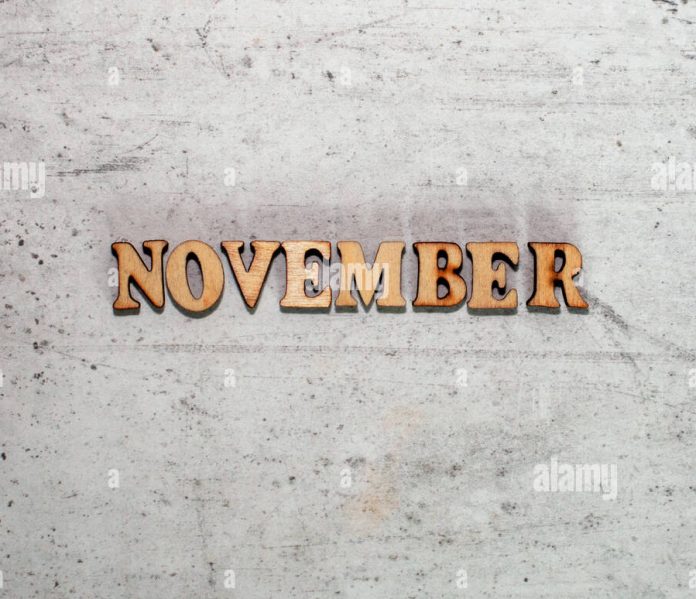By Fr Pat Amobi Chukwuma
How time flies! The year, 2025, which began a few months ago, is about to end. November is the eleventh and penultimate month of the year in the Julian and Gregorian calendars. It lasts for thirty days. November symbolizes transition, remembrance, gratitude, and final harvest. With the falling of the last leaves, the month represents a time of shedding old things to make way for new beginnings. Hence, it is regarded as a transitional month. After it, comes December, which is the last month of the year. It is a time for sober reflections and stock taking.
A few days ago, a young woman who has just put to bed a bouncing baby boy (BBB) came into my office to register for infant baptism. I asked her the name which she would like the child to answer. She replied, “Father, I want him to be called Saint, because he was born on first day of November.” I objected.
She insisted. I explained to her that Saints live in heaven and not on earth. She argued that there are many living Saints in this world. Then, I asked her what happens if the child grows up and commits sin. She replied that he will automatically answer Saint Sinner (SS). Both of us were thrown into durable laughter. How can one be a Saint and a Sinner at the same time?
Indeed no one is born a Saint because a newly born baby has an element of Original Sin inherited from Adam and Eve. That is why infants are baptized in order to purge them of the inherited sin. A Saint is impeccable and already enjoying the glory of heaven. On the other hand, a sinner can become a Saint by repentance and perseverance. Saints live in heaven while sinners inhabit the earth while struggling to become Saints. Sainthood is the crown of earthly life well lived. Everyone is called to be a Saint. Only hardened sinners end up in hell.
The first day of November is dedicated to the Solemnity of All Saints (All Hallows) enjoying the Beatific Vision. Are the seminarians studying at All Hallows Seminary Onitsha Saints? Please go and verify. I am anxious to know. In the Catholic Church, All Saints Day (1st November) is celebrated as a Holy Day of Obligation, whereby all Catholic faithful are obliged to attend Mass and abstain from serious work.
The Saints in Heaven are regarded as the Church Triumphant. They were in the world and underwent various trials. Some of them were sinners who later repented and persevered in good deeds unto death. Some of them were martyred for their faith while on earth. They lived exemplary lives on earth.
They are the witnesses of perfection. We are told that nothing imperfect will enter the Kingdom of God. Who is then perfect apart from God? Genuine struggle for perfection plus the grace of God can make it possible.
Someone told me that anyone who dies inside a church is automatically a saint. I told him that the place of death does not determine sanctity; rather it is the state of spirituality that determines holiness. No wonder a certain sick woman came for Mass on one Sunday and refused to go home at the end. Late in the evening of that Sunday I persuaded her to go home so that we can lock the church. She adamantly asserted, “No, I will not go. I want to die inside this church.”
As a last resort, with the aid of my houseboys, we bundled her into my car and I drove her by force to her house. Her husband and children were very appreciative for my kind gesture. She later died in the hospital and not in the church. Just last week, a thief was caught red-handed in our church while he was about to steal money from our catechist’s table. When he was quizzed, he said that it was a mistake. Suppose he died during the act of stealing in the church, does he automatically become a Saint?
Immediately the euphoria of All Saints is over, the Commemoration of All Souls comes up on the 2nd day of November. Which souls are being referred to, since all human beings are endowed with souls by the Creator? Man is made of soul and body. A soul without a body is a spirit. A body without a soul is a matter. At death the body decomposes while the soul goes back to the world of the spirits.
It stands before the judgment seat of God to give account of what he or she did as a human being (body and soul). After judgment comes reward or punishment. A life well lived on earth merits heaven. On the other hand, a life badly lived on earth merits hell fire. Hell is a great inferno and a condition of God’s total absence. Imagine what life would be without the Almighty Creator.
God is a just and infinite Being. He gives each person what he or she deserves. However He is exceptionally merciful. In fact, if God does not temper justice with mercy, then heaven will be empty. In academic examination, some students score excellent marks while some fail woefully. Those who fail woefully repeat the same class in the next academic year while the intelligent ones are promoted to the next class.
Few others score weak pass and are promoted on trial. If they do well later, they forge ahead; if not they are demoted. The Holy Scripture says that nothing imperfect will enter the Kingdom of God. But some will be saved through fire (1 Cor. 3:15). This saving fire is known as Purgatory. It comes from the word ‘purge’ which means ‘to cleanse.’ Purging removes imperfection.
Therefore the Souls being commemorated by the Church on November 2 are the souls which neither passed excellently nor failed woefully in the final divine examination (judgment). They are said to suffer more than anyone on earth because they are deprived of Beatific Vision. However their punishment is temporal while that of souls in hell is eternal. The souls in purgatory can no longer do penance by themselves.
Their final salvation depends solely on the mercy of God, prayer and mortification of the Church Militant on earth. Numerous souls are liberated on 2nd November every year. That is the essence of praying for the dead (souls in purgatory). The souls in heaven do not need our prayers. Instead they pray for us. Prayer cannot save any soul in hell. The reason why we pray for any departed soul is that we are not sure of his or her final destination. Only God knows.
The Solemn celebration of Christ the Kings also falls in November. This year 2025 it takes place on Sunday 23rd November. It marks the last Sunday of the Church’s liturgical year. In the name of Jesus Christ, every knee shall bow. He is the King of kings and Lord of lords. When I was pasturing God’s flock at Abagana, I experienced occasions on which small masquerades disappear whenever a big masquerade appears.
The Kingship of Jesus Christ cannot be compared to any earthly king. Earthly kings can rule by hook and crook. The Kingship of Jesus Christ is divinely ordained and cannot be challenged. Where are Herod and Pilate now? Their kingship ended with their demise. Jesus Christ rules forever on earth and in Heaven. We troupe en mass to celebrate the Kingship of Our Lord and Master every last Sunday of the liturgical year. However He does not rule by force.
He rules over the hearts that confess Him as Lord and Saviour by words and actions. Sacramental purging of our sins yields a fruitful celebration of Christ the King. Jesus Christ himself remarks, “It is not those who call me ‘Lord, Lord’ will enter the Kingdom of God, but those who do the will of my Father in Heaven” (Mtt. 7:21). This calls for personal introspection.
Finally, the first Sunday of Advent this year 2025 falls on Sunday 30th November. Advent is a 4-week preparation for Christmas and for the Parousia (the second coming of Jesus Christ). The current liturgical year ends on 29th November 2025 while the new liturgical year begins on Sunday 30th November 2025. What a wonderful November package! I was born a fool on 1st April and would like to die a Saint on 1st November, but not so soon.




